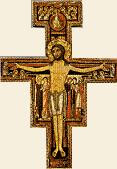
The Franciscan family is not just an apostolic family. In reality, it is a fraternal family. Francis left to his sons and daughters a strong fraternal spirit in his writings and by way of personal example. Nothing was more important to him than his brothers and sisters. It is this spirit of brotherhood that has drawn so many millions to the Franciscan family through the centuries.
Francis, too, was very unique in his way of doing things. He was the first religious founder to introduce the idea of a secular religious order into the Church.
What has kept the Secular Franciscan Order alive for 800 years has been the great love its members have for Francis. Those who joined the order were inspired by his journey and his application of the Gospel.
Franciscan brothers and sisters are to spend time reflecting on Francis' spirituality. This gathering is a school where the individual learns how to live the Gospel using Francis' manner in the world. People should then take notice of the different set of values he lives.
It is important to keep one thing clear: the Secular Franciscan believes that the secular world is holy and that secular brothers and sisters can live a religious life in this world, without having to enter a monastery. The Secular Order must always protect and preserve the secular lifestyle, but not the worldly lifestyle. There is a difference.
















